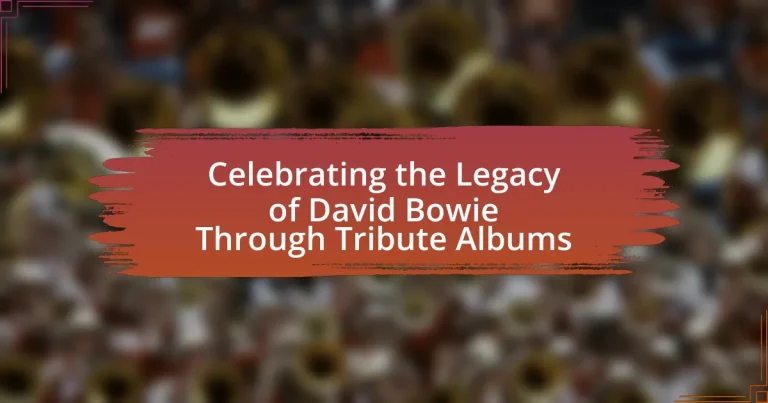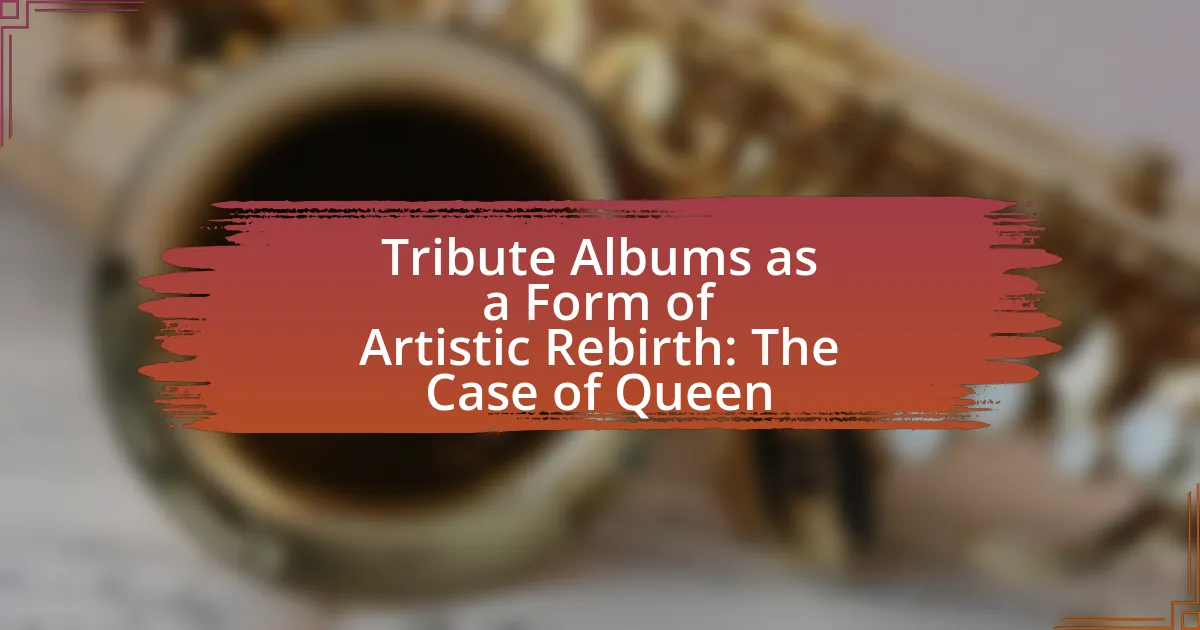David Bowie, a pivotal figure in music history, is celebrated for his profound influence across various genres and his innovative artistry. His legacy is explored through tribute albums that reinterpret his iconic work, showcasing the impact he has had on contemporary artists and the music industry as a whole. The article examines how these tribute albums honor Bowie’s contributions, highlight themes of identity and transformation, and foster community among fans. Notable tribute albums and standout tracks are discussed, emphasizing their role in preserving Bowie’s cultural significance and introducing his music to new audiences.
What is the significance of David Bowie’s legacy in music?
David Bowie’s legacy in music is significant due to his profound influence on various genres, innovative artistry, and cultural impact. He reshaped the landscape of rock and pop music through his unique blend of styles, including glam rock, electronic, and soul, which inspired countless artists. Bowie’s ability to reinvent himself, exemplified by his alter egos like Ziggy Stardust, showcased his artistic versatility and challenged societal norms regarding identity and gender. His album “The Rise and Fall of Ziggy Stardust and the Spiders from Mars” is often cited as a landmark in music history, reflecting his role in the evolution of rock music. Additionally, Bowie’s work has been recognized with numerous awards, including two Grammy Awards, solidifying his status as a pivotal figure in the music industry.
How has David Bowie’s influence shaped contemporary music?
David Bowie’s influence has profoundly shaped contemporary music by introducing innovative concepts of identity and genre fluidity. His ability to blend rock, pop, electronic, and avant-garde styles has inspired countless artists, leading to a more eclectic and experimental approach in modern music. For instance, artists like Lady Gaga and The Weeknd have cited Bowie as a key influence, particularly in their use of theatricality and genre-blending. Additionally, Bowie’s pioneering use of visual aesthetics in music videos and live performances has set a standard that contemporary musicians continue to emulate, reinforcing the importance of visual storytelling in music. His impact is evident in the way current artists approach their personas and sound, demonstrating Bowie’s lasting legacy in the evolution of music.
What are the key elements of Bowie’s musical style that resonate today?
David Bowie’s musical style resonates today through its innovative blend of genres, theatricality, and exploration of identity. His ability to fuse rock, pop, electronic, and avant-garde elements created a sound that remains influential, as seen in contemporary artists who draw from his eclecticism. Bowie’s theatrical approach, characterized by elaborate performances and personas like Ziggy Stardust, continues to inspire modern musicians to embrace visual storytelling in their work. Additionally, his exploration of themes such as gender fluidity and self-identity has paved the way for discussions in today’s music scene, reflecting societal changes and resonating with diverse audiences.
How have artists cited Bowie as an inspiration in their work?
Artists have cited David Bowie as an inspiration in their work by incorporating his innovative style, genre-blending music, and theatrical persona into their own creations. For instance, artists like Lady Gaga and The Killers have openly acknowledged Bowie’s influence on their music and performance art, often referencing his ability to challenge norms and embrace identity fluidity. Additionally, Bowie’s impact is evident in tribute albums such as “We Are All Made of Stars,” where various musicians reinterpret his songs, showcasing his lasting legacy in contemporary music.
Why are tribute albums important in honoring musical legacies?
Tribute albums are important in honoring musical legacies because they serve as a collective acknowledgment of an artist’s influence and impact on music and culture. These albums allow contemporary artists to reinterpret and celebrate the work of legendary musicians, thereby introducing their music to new audiences. For instance, David Bowie’s tribute albums, such as “We Are All Made of Stars,” feature various artists covering his iconic songs, which not only pays homage to his creativity but also reinforces his lasting legacy in the music industry. By showcasing diverse interpretations, tribute albums help preserve the original artist’s contributions while fostering a sense of community among fans and musicians alike.
What role do tribute albums play in preserving an artist’s impact?
Tribute albums play a significant role in preserving an artist’s impact by reinterpreting their work and introducing it to new audiences. These albums often feature various artists covering the original songs, which not only honors the legacy of the artist but also keeps their music relevant in contemporary culture. For instance, David Bowie’s tribute album “We Were So Turned On” includes diverse artists who reinterpret his iconic tracks, thereby showcasing his influence across different genres and generations. This process of reinterpretation helps solidify the artist’s cultural significance and ensures that their contributions to music continue to resonate long after their passing.
How do tribute albums introduce an artist’s work to new audiences?
Tribute albums introduce an artist’s work to new audiences by featuring various artists covering the original artist’s songs, thereby broadening exposure to their music. This format allows listeners who may not be familiar with the original artist to discover their work through interpretations by contemporary or popular musicians. For example, the tribute album “We All Shine On: A Tribute to John Lennon” included covers by well-known artists, which attracted their fan bases and introduced them to Lennon’s catalog. Such collaborations often highlight the influence and relevance of the original artist, making their music accessible to a new generation.

What are some notable tribute albums dedicated to David Bowie?
Notable tribute albums dedicated to David Bowie include “We Were So Turned On: A Tribute to David Bowie,” released in 2010, which features various artists covering Bowie’s songs, and “A Bowie Celebration: Just For One Day,” released in 2020, showcasing performances from multiple musicians celebrating his legacy. Additionally, “Bowie: The Ultimate Tribute” released in 2016, compiles various artists’ interpretations of his work. These albums collectively honor Bowie’s influence on music and culture, highlighting the impact he had on a diverse range of artists.
Which tribute albums have received critical acclaim?
The tribute albums that have received critical acclaim include “We Were So Turned On: A Tribute to David Bowie,” which features various artists covering Bowie’s songs and has been praised for its diverse interpretations. Another notable album is “A Bowie Celebration: Just for One Day!” which showcases live performances by artists influenced by Bowie and has garnered positive reviews for its emotional resonance and tribute to his legacy. Additionally, “Bowie: The Ultimate Collection” has been recognized for its comprehensive selection of Bowie’s work and the quality of the tribute performances. These albums have been highlighted in music reviews and articles for their artistic merit and connection to Bowie’s influential career.
What are the standout tracks on these tribute albums?
Standout tracks on David Bowie tribute albums include “Heroes” covered by The Wallflowers, which captures the essence of Bowie’s original with a modern twist. Another notable track is “Space Oddity” performed by Chris Hadfield, who recorded it aboard the International Space Station, adding a unique context to the classic. Additionally, “Life on Mars?” by Lana Del Rey showcases her haunting vocal style, paying homage to Bowie’s iconic songwriting. These tracks exemplify the diverse interpretations of Bowie’s work, highlighting his lasting influence across generations.
How do these albums reflect Bowie’s diverse musical catalog?
Bowie’s tribute albums reflect his diverse musical catalog by showcasing a wide range of genres and styles he explored throughout his career. For instance, albums like “A Bowie Celebration: Just For One Day!” feature artists from rock, pop, electronic, and jazz backgrounds, highlighting Bowie’s ability to transcend musical boundaries. Additionally, the inclusion of tracks from various eras of his career, such as glam rock anthems and introspective ballads, illustrates his evolution as an artist. This diversity is further evidenced by the participation of contemporary artists who reinterpret his work, demonstrating Bowie’s lasting influence across multiple generations and musical landscapes.
What themes are commonly explored in Bowie’s tribute albums?
Common themes explored in Bowie’s tribute albums include identity, transformation, and the impact of fame. These albums often reflect Bowie’s own exploration of self through his music, showcasing his ability to reinvent himself across genres and personas. For instance, tribute albums frequently highlight the duality of his public and private life, emphasizing the complexities of celebrity and personal identity. Additionally, the theme of transformation is prevalent, as many artists cover Bowie’s songs to reinterpret his work, demonstrating how his influence transcends generations and inspires new artistic expressions. The impact of fame is also a recurring theme, as tribute albums often address the challenges and pressures associated with being in the spotlight, mirroring Bowie’s own experiences throughout his career.
How do tribute albums interpret Bowie’s lyrical content?
Tribute albums interpret Bowie’s lyrical content by reinterpreting his themes and emotions through the lens of various artists, often highlighting the universality and relevance of his messages. For instance, artists cover Bowie’s songs, infusing them with their unique styles while maintaining the original lyrical intent, which can reveal new meanings or emotional depths. An example is the tribute album “We Were So Turned On,” which features diverse artists covering Bowie’s work, showcasing how his lyrics resonate across different genres and generations. This approach not only honors Bowie’s legacy but also emphasizes the timelessness of his lyrical narratives, as seen in the way contemporary artists connect with his exploration of identity and existential themes.
What stylistic choices do artists make when covering Bowie’s songs?
Artists covering Bowie’s songs often make stylistic choices that include altering the arrangement, changing the vocal delivery, and incorporating different genres. For instance, many artists reinterpret Bowie’s theatrical and eclectic sound by infusing their own musical influences, such as rock, pop, or electronic elements, which can significantly shift the song’s emotional tone. Additionally, vocalists may choose to modify the phrasing or emotional intensity of the lyrics to reflect their personal connection to the material, as seen in covers by artists like Nirvana and Lady Gaga, who both brought unique interpretations to Bowie’s work. These choices not only pay homage to Bowie’s original artistry but also allow the covering artists to express their individuality, thereby enriching the legacy of his music.
How do tribute albums contribute to the ongoing celebration of David Bowie’s legacy?
Tribute albums contribute to the ongoing celebration of David Bowie’s legacy by reinterpreting his iconic music through the lens of contemporary artists, thereby introducing his work to new audiences. These albums often feature a diverse range of musicians who pay homage to Bowie’s innovative style and influence, reinforcing his status as a cultural icon. For instance, the tribute album “We Are All Made of Stars” includes various artists covering Bowie’s songs, showcasing the enduring relevance of his music across different genres and generations. This not only honors Bowie’s artistic contributions but also keeps his spirit alive in the music industry, ensuring that his legacy continues to inspire future musicians and fans alike.
What impact do tribute albums have on Bowie’s fan community?
Tribute albums significantly strengthen Bowie’s fan community by fostering a sense of connection and shared appreciation among fans. These albums often feature various artists covering Bowie’s iconic songs, which not only introduces his music to new audiences but also allows existing fans to experience his work through different interpretations. For instance, the tribute album “We Were So Turned On: A Tribute to David Bowie” showcases diverse artists, enhancing the communal celebration of Bowie’s legacy. This collective engagement reinforces fan identity and loyalty, as fans come together to honor and discuss the impact of Bowie’s artistry.
How do fans engage with tribute albums compared to original works?
Fans engage with tribute albums differently than with original works, often viewing tribute albums as a means to celebrate and honor the legacy of the original artist. For instance, tribute albums can evoke nostalgia and foster a sense of community among fans who share a collective appreciation for the artist’s influence, as seen in the case of David Bowie’s tribute albums, which often feature various artists interpreting his iconic songs. This engagement is characterized by active participation in discussions, social media sharing, and attendance at tribute concerts, which are often organized to commemorate the artist’s impact. In contrast, engagement with original works tends to focus more on personal connection and emotional resonance with the artist’s authentic voice and vision, as original albums are typically seen as the definitive expression of the artist’s creativity.
What events or performances are associated with these tribute albums?
Tribute albums associated with David Bowie often feature live performances and tribute concerts that celebrate his music and legacy. Notable events include the “A Bowie Celebration: The Life & Music of David Bowie” concert series, which showcases various artists performing Bowie’s iconic songs. Additionally, the “Bowie: The Musical” production highlights his influence through theatrical performances. These events not only honor Bowie’s contributions to music but also engage fans and artists alike in a collective remembrance of his impact on popular culture.
How can listeners best appreciate David Bowie’s tribute albums?
Listeners can best appreciate David Bowie’s tribute albums by actively engaging with the diverse interpretations of his music presented by various artists. This engagement allows listeners to explore how different musicians honor Bowie’s legacy through their unique styles and perspectives. For instance, tribute albums like “We Were So Turned On” and “A Bowie Celebration: The David Bowie Alumni Tour” feature a range of genres and artists, showcasing Bowie’s influence across the music industry. By comparing these interpretations and understanding the context behind each artist’s choice, listeners can gain deeper insights into Bowie’s impact and the emotional resonance of his work.
What are some recommended listening practices for tribute albums?
To effectively listen to tribute albums, one should focus on understanding the original artist’s influence and the reinterpretation by various artists. Engaging with the tribute album while comparing it to the original works enhances appreciation for both the tribute and the legacy of the artist being honored. Listening in a quiet environment allows for better focus on the nuances and variations in style, instrumentation, and vocal delivery. Additionally, exploring the background of the contributing artists can provide context that enriches the listening experience. This practice is supported by the fact that tribute albums often aim to showcase diverse interpretations, which can lead to a deeper understanding of the original artist’s impact on music.
How can fans explore the connections between tribute albums and Bowie’s original music?
Fans can explore the connections between tribute albums and Bowie’s original music by analyzing the song choices, interpretations, and stylistic elements present in the tribute recordings. Tribute albums often feature artists covering Bowie’s iconic tracks, allowing fans to compare the original arrangements and lyrical themes with the new renditions. For instance, the tribute album “We Were So Turned On: A Tribute to David Bowie” showcases various artists reinterpreting Bowie’s work, highlighting how different musical styles can reflect the essence of his original compositions. This comparative listening experience deepens fans’ understanding of Bowie’s influence and the emotional resonance of his music across diverse genres.




